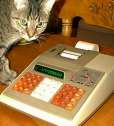Texas Instruments TI-53
| Datasheet legend
Ab/c:
Fractions calculation
AC: Alternating current BaseN: Number base calculations Card: Magnetic card storage Cmem: Continuous memory Cond: Conditional execution Const: Scientific constants Cplx: Complex number arithmetic DC: Direct current Eqlib: Equation library Exp: Exponential/log functions Fin: Financial functions Grph: Graphing capability Hyp: Hyperbolic functions Ind: Indirect addressing Intg: Numerical integration Jump: Unconditional jump (GOTO) Lbl: Program labels LCD: Liquid Crystal Display LED: Light-Emitting Diode Li-ion: Li-ion rechargeable battery Lreg: Linear regression (2-var. stats) mA: Milliamperes of current Mtrx: Matrix support NiCd: Nickel-Cadmium recharg. batt. NiMH: Nickel-metal-hydrite rech. batt. Prnt: Printer RTC: Real-time clock Sdev: Standard deviation (1-var. stats) Solv: Equation solver Subr: Subroutine call capability Symb: Symbolic computing Tape: Magnetic tape storage Trig: Trigonometric functions Units: Unit conversions VAC: Volts AC VDC: Volts DC |
| ||||||||||||||||||||||||||||||||||||||||||||||||||||||||
Texas Instruments TI-53
 Were it that the Litronix 2290 didn't exist, the TI-53 would surely win an award as the least functional programmable calculator ever made (okay, I'm being unfair. There were some impressively dysfunctional machines made by Sinclair, too.) 32 program steps, only one memory register, no control transfer or conditional instructions... not a heck of a lot you can do with this beast! It's worse than the TI-55, which I thought of, until I received this TI-53, as the least programmable "almost programmable" calculator Texas Instruments ever made. To add insult to injury: they actually placed the word "programmable" on this calculator's faceplate, something they didn't dare to do with the TI-55.
Were it that the Litronix 2290 didn't exist, the TI-53 would surely win an award as the least functional programmable calculator ever made (okay, I'm being unfair. There were some impressively dysfunctional machines made by Sinclair, too.) 32 program steps, only one memory register, no control transfer or conditional instructions... not a heck of a lot you can do with this beast! It's worse than the TI-55, which I thought of, until I received this TI-53, as the least programmable "almost programmable" calculator Texas Instruments ever made. To add insult to injury: they actually placed the word "programmable" on this calculator's faceplate, something they didn't dare to do with the TI-55.
The programming model of the TI-53 has some peculiar differences from the programming model of most TI calculators. It is the only TI calculator I know of on which the keycodes for the number keys are not the numeric values of the keys but represent their keyboard positions. The code 00 (the default with which program memory is filled on power-up) does not represent a valid instruction and causes an error when executed. The INV key also doubles as the 2nd (second function) key but it's not merged with the next keystroke, making program memory even more limited.
No room to build a Gamma function program on this beast, of course. Here is, instead, a program that implements Stirling's approximation of the factorial:
00 41 STO
01 55 ×
02 73 2
03 55 ×
04 42 π
05 85 =
06 13 √
07 55 ×
08 51 RCL
09 35 yx
10 51 RCL
11 45 ÷
12 51 RCL
13 31 INV
14 34 lnx
15 55 ×
16 43 (
17 51 RCL
18 11 1/x
19 45 ÷
20 72 1
21 73 2
22 75 +
23 72 1
24 85 =
25 81 R/S
26 31 INV
27 81 RST


